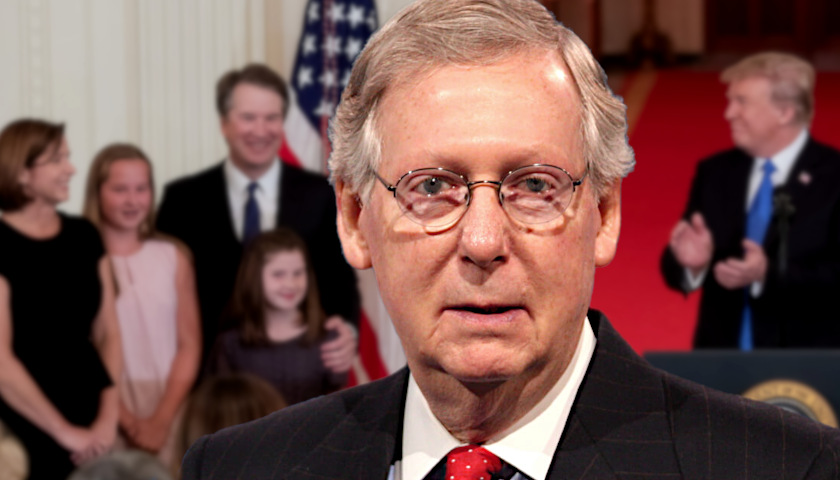by Kevin Daley
Senate Majority Leader Mitch McConnell told senior Republicans that he will schedule Judge Brett Kavanaugh’s confirmation vote on a date just before the November elections if Democrats demand access to the full scope of records the judge produced in the George W. Bush administration.
Democrats are leveraging the access dispute to slow Kavanaugh’s nomination, as it is one of the few mechanisms they have to delay progress on the appointment.
Politico reports that McConnell believes scheduling a confirmation vote in immediate proximity to the midterm elections will exacerbate political pressure on embattled Democrats from red states to support Kavanaugh.
 “To me, it’s in their best interest to have that vote done for a lot of their red-state senators who are facing their voters,” GOP Sen. John Thune of South Dakota.
“To me, it’s in their best interest to have that vote done for a lot of their red-state senators who are facing their voters,” GOP Sen. John Thune of South Dakota.
Democrats want access to a massive body of work Kavanaugh generated during his time in the Bush White House. The judge entered the administration as associate White House counsel, then became staff secretary in 2006. In these capacities he advised senior officials on a range of legal issues and managed the president’s paper flow. He left the executive branch following his confirmation to the U.S. Court of Appeals for the D.C. Circuit.
All told, Kavanaugh’s Bush-era paper trail is believed to span one million pages. He’s also written some 300 decisions on the D.C. Circuit, and an untold number of documents for Ken Starr during his tenure as independent counsel.
GOP Sen. Chuck Grassley of Iowa, who chairs the Senate Judiciary Committee, warned Democrats against turning the Kavanaugh confirmation into a fishing expedition, and said lawmakers would review a “relevant and proportional” sample of his work product.
“Many Democrats announced their opposition to this nominee before the vetting process ever began,” Grassley said. “They’ve made clear that their plan will be to obstruct and delay at every corner, and reviewing Judge Kavanaugh’s record will be no different. Rest assured, this process will be fair and thorough. At the same time, I will not allow taxpayers to be on the hook for a government-funded fishing expedition.”
Chief Justice John Roberts, Justice Elena Kagan, and Justice Neil Gorsuch worked in the executive branch before their elevation to the high court. The judiciary committee reviewed less than 200,000 records in connection with their nominations, just one-fifth of the work product Democrats are now seeking access to for Kavanaugh.
Democrats argue a thorough review is warranted because his service coincided with critical, and highly controversial, policy decisions about detention of enemy combatants and torture. Liberals in the Senate are particularly aggrieved by the 2003 confirmation of Judge Jay Bybee to the 9th U.S. Circuit Court of Appeals — lawmakers discovered he helped author the so-called torture memos, which provided legal justification for Bush-era enhanced interrogation techniques, only after his confirmation.
Judiciary Committee Democrats have accused Kavanaugh of deception on this point before. He told senators during his 2006 confirmation hearing that he was not involved in the formulation of rules for combatant detention, though a 2007 news report revealed he had at least one conversation with administration officials regarding Justice Anthony Kennedy’s receptiveness to such policies.
No Democratic senator has yet met with Kavanaugh. Supreme Court nominees typically pay courtesy calls on lawmakers in advance of their confirmation hearings to discuss issues of interest to senators. The leadership of both parties typically meets with a nominee at the beginning of the process, though Senate Minority Leader Chuck Schumer has not yet received Kavanaugh in his Capitol Hill offices.
Democrats are not expected to set meetings with the judge until the document dispute is resolved.
– – –
Kelin Daley is a reporter at Daily Caller News Foundation. Follow Kevin on Twitter.




